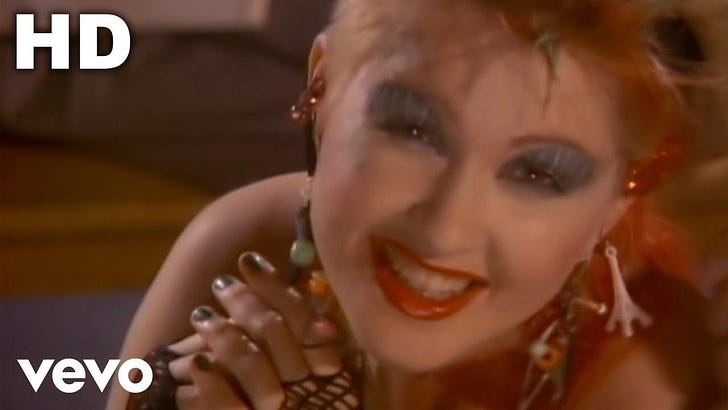"You always have to remember—no matter what you're told—that God loves all the flowers, even the wild ones that grow on the side of the highway." -Cyndi Lauper
I am always at a bit of a loss of words for how to describe Cyndi Lauper. As a kid, I sometimes enjoyed her music. Sometimes I could pass. But was it New Wave? Punk? Pop? Weird Al Yankovich adjacent?
Who cares?
Lauper's antics betrayed the fact that her serious music career did not begin until she was already thirty. She swapped around the vowels in her name, which perfectly fit her ever changing array of hairstyles and colors. And all that fit perfectly into the golden age of music videos.
But the moment you might dismiss her as a freak show act, Lauper pulled off sweetly original soul punk—because the weird kids aren't just dancing fools all the time.
And as they grow up healthy, if they grow up healthy, the weird kids go mainstream. In the end, most everyone recognizes a special arrangement and then wants to play it, too.
Goonies
"Humor is a great vehicle for getting a message across. If you get too serious, you could die of starch." -Cyndi Lauper
Lauper was also something like a role model for not taking oneself too seriously, as exhibited by this clip from Vibes, a charming romantic comedy flick (is that still a thing?) about a psychic treasure hunting duo.
Is that a sex symbol?
Yes, actually. But it's perfectly fine if you weren't thinking that. I think that was part of the point? It was easier to tell by the end of the film.
Though Lauper starred in Vibes, she might be better remembered for a movie in which she never appeared: the 80s box office smash Goonies.
'Goonies' is a great "word". It's kind of a catchall for anyone who isn't who you were going to draw in response to nearly any given noun. And maybe that's a good lead-in to the culture war part of this story.
True Colors
"I can't judge the way other people behave. I can only look at myself." -Cyndi Lauper
If Cyndi Lauper had been gay, would anyone but her boyfriends have noticed?
The chart-topping hit single True Colors was the only song on Lauper's second album she did not help write. But somehow the song seems like a perfect fit for this conversation. From Wikipedia:
Billy Steinberg originally wrote "True Colors" about his own mother. Tom Kelly altered the first verse and the duo originally submitted the song to Anne Murray, who passed on recording it, and then to Cyndi Lauper.[2] Their demo was in the form of a piano-based gospel ballad like "Bridge over Troubled Water". Steinberg told Songfacts that "Cyndi completely dismantled that sort of traditional arrangement and came up with something that was breathtaking and stark."[1] Other songs they wrote for Lauper include "I Drove All Night" and "Unconditional Love".
I remember this. I remember when weird was generally nonthreatening, like it wasn't…part of a war. Like it was usually part of beautiful goofiness in the same breath as appreciating mothers sharing tea time.
Somewhere along the way, for reasons we can all imagine, True Colors also became a sort of anthem for the LGBTQ community. And if anyone is going to pick one, why not? It's a love first song, and that's the bedrock that best supports any community.
If you're like me, you harbor no animosity toward people born with a proclivity toward a nonstandard sexuality, but you're often aghast at a growing subset of the activism—and definitely draw the line prior to "teaching" elementary school kids the nuances of sexual politics. Do you wonder if there is room left in the world to just stand up for dignity and protect young people from harmful bigotries without worrying about whether politics comes before algebra? As if children are not already dealing with enough strangeness being [more] different [than usual] in a challenging world where not everyone gets to grow up in a safe home?
You will want to hear the very end. It's the key to the article, really.
Lauper chose a mission of focusing on children at risk for homelessness.
With the work that I’ve been doing with the True Colors Fund, it really started with the True Colors tour and opportunity to create a tour that was totally inclusive and have all different kinds of people on tour with you — not just famous people, but all kinds of people. It was exciting to me. I always thought that multiracial tours were good because even that created a community of inclusivity, but to also include LGBTQ people was a big deal.
When we saw this homeless situation, which is — you know the statistics, right? There are up to 1.6 million homeless kids and up to 40 percent are LGBTQ. You feel like, well, what the heck’s going on? These kids are being flung out like hot cakes. You realize that you gotta do more. You gotta educate people, you gotta reach out to the kids. We started to work on how we could prevent LGBTQ youth homelessness.
If LGBT politics generally looked like this, would there even be a culture war? Or would this level of societal politics be a series of mostly polite (and sometimes silly) debates at the margins while we figured out how to make sure nobody young grew up traumatized?
Struggles and Music
"Understand where it is you want to go. Then picture yourself there. If you can picture yourself there, then you can be there." -Cyndi Lauper
Positive visualization may be the best correlation for a solid future. If we teach that to all the kids, whatever we're worried about becomes a lot less to worry about.
It would be easy to imagine that Cyndi Lauper was once just a girl who grew up having fun. Her parents divorced when she was young. Her mother remarried and divorced again. She left home poor and searched for years for the path she eventually found, which happened a decade after she got past not being able to afford toilet paper. Success came after working in a dog kennel, for arrogant artists, then as a background singer, and finally as the icon, Cyndi Lauper.
There is no rewinding the story of the culture war we're saddled with. But if we're going to take something forward with us as we figure this out, let's take Cyndi Lauper into the future. She is a good reminder that we won't get there without a struggle, and it might just be more fun on the other side.





Most positive bit of cultural commentary that I've read in a very long time. Thank you!!!
Just an interesting tidbit about her. She is a phenomenal Dulcimer player. If you even know what a Dulcimer is, you are ahead of 99% of the populace. If you can play one, let me know. Other than at a roots music festival I’ve never met another player in “real life.” Here she is in 1995 with Time After Time.
https://youtu.be/w5ikJcGm7ps
BTW, Brian Jones of The Rolling Stones played the Dulcimer on most of their big hits. Jumping Jack Flash. Yeah, that all Dulcimer.